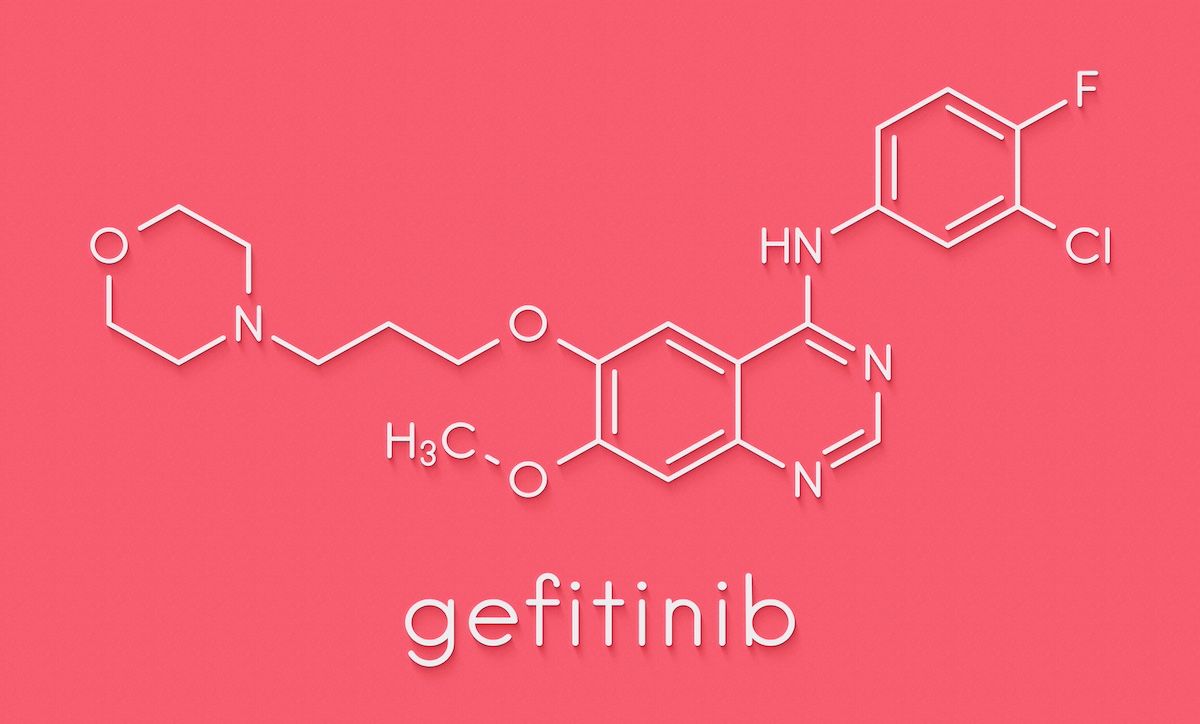- Center on Health Equity & Access
- Clinical
- Health Care Cost
- Health Care Delivery
- Insurance
- Policy
- Technology
- Value-Based Care
Positive 5-Year Results for Gefitinib Combo in EGFR-Variant Lung Cancer
Consistent with previous observations, overall survival and progression-free survival remained strong at the follow-up point.
At a median 5-year follow-up, patients with epidermal growth factor receptor (EGFR)–variant non–small cell lung cancer (NSCLC) who added chemotherapy to gefitinib continued to have strong progression-free survival (PFS) and overall survival (OS) compared with those treated with gefitinib alone, according to a research letter published in JAMA Oncology.1
The original trial, the results of which were published in Journal of Clinical Oncology in 2019, analyzed the potential benefits of adding pemetrexed and carboplatin to a tyrosine kinase inhibitor (TKI) such as gefitinib.2
In the present study, overall survival was 36% better with chemotherapy and gefitinib vs gefitinib alone | Image Credit: olekuul.be - stock.adobe.com

The phase 3 trial found that adding chemotherapy to gefitinib improved PFS (HR, 0.51; 95% CI, 0.39-0.66) and OS (HR, 0.45; 95% CI, 0.31-0.65) in patients with NSCLC, the investigators of that study and the current research letter note. However, there were increased toxicities in patients who were treated with gefitinib and carboplatin.
Five years later, the study authors sought to evaluate the long-term outcomes of the individuals in their study.
In total, 350 patients were recruited for the original study, with 174 being randomized to gefitinib plus chemotherapy and 176 to gefitinib alone. At the median follow up of 5 (95% CI, 4.9-5.1) years, there were 147 deaths in the gefitinib-plus-chemotherapy group and 165 in the gefitinib-alone group.
Among gefitinib-alone patients, the median OS was 17.6 (95% CI, 15.3-21.5) months, while in the gefitinib-plus-chemotherapy group, median OS was 27.5 (95% CI, 24.8-30.8; P = .001) , the investigators found.
Furthermore, in the gefitinib-alone group, the 5-year OS was 4.42% (95% CI, 1.98%-8.39%), while it was 13.04% (95% CI, 8.27%-18.9%) in the gefitinib-plus-chemotherapy group (HR, 0.58; 95% CI, 0.46-0.72). The investigators found that regardless of the type of EGFR variation in a patient or any brain metastases, gefitinib plus chemotherapy improved patient outcomes.
Across 5 years, the PFS was 1.71% (95% CI, 0.47%-4.54%) in the gefitinib group and 6.67% (95% CI, 3.54%-11.15%) in the gefitinib-plus-chemotherapy group (HR, 0.53; 95% CI, 0.42-0.65; P < .001). Additionally, there were 175 progression events in the gefitinib group and 161 in the combination group.
Previous studies have explored the feasibility of adding chemotherapy to TKIs. Specifically, updated results from the NEJ009 study indicate numerically significant OS improvement, but not statistically significant improvement,3 which differs from the results of the current study.
The investigators attributed this difference to osimertinib access, which they noted was limited in their study setting. An additional note from the NEJ009 study is that 74% of patients in the gefitinib group received postprogression therapy,3 which emphasizes the importance of offering the best treatment up front and as soon as possible.
Lastly, the authors of the research letter commented on the ethnic differences among Japanese patients’ pharmacokinetics and pharmacodynamics that were a factor in the NEJ009 study, which could have led to differing results.3
Despite the improvements in outcomes that has come with the widespread availability of higher-generation TKIs, access to these agents has been limited in low- and middle-income countries, the investigators noted. To absolve this accessibility problem, work must be ongoing to increase production and proliferation of these life-saving drugs.
“This [randomized clinical trial found that PFS and OS benefits of adding chemotherapy to gefitinib were sustained at 5 years, confirming our earlier results reported at median follow-up of 17 months,” the study investigators concluded.
References
1. Noronha V, Patil V, Menon N, et al. Gefitinib vs gefitinib plus pemetrexed and carboplatin chemotherapy in EGFR-variant lung cancer—long-term results of a randomized clinical trial. JAMA Oncol. Published online April 25, 2024. doi:10.1001/jamaoncol.2024.0584
2. Noronha V, Patil V, Joshi A, et al. Gefitinib vs gefitinib plus pemetrexed and carboplatin chemotherapy in EGFR-variant lung cancer. JCO. 2020:38(2);124-136. doi:10.1200/JCO.19.01154
3. Miyauchi E, Morita S, Nakamura A, et al. Updated analysis of NEJ009: gefitinib-alone versus gefitinib plus chemotherapy for non–small-cell lung cancer with mutated EGFR. JCO. 2020:40(31);3587-3592. doi:10.1200/JCO.21.02911
